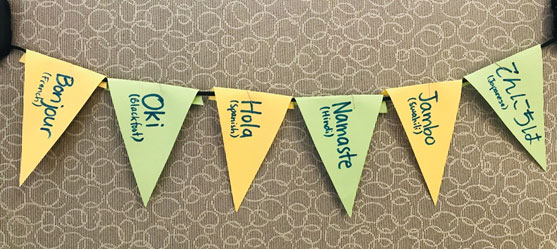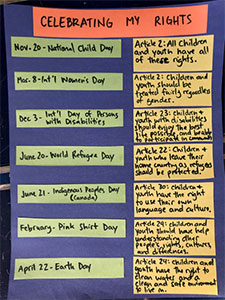Human rights - day 1 fair treatment
These activities will help youth learn about human rights and their guiding principles, like “Fair Treatment”. They can be done alone, but work best with one or more friends on a video chat like Skype, Zoom, Facetime, etc.
Grades K-3
Grades K-3
Mindfulness Activity
Trivia question: What is in the centre of the Canadian flag?
Mindfulness Activity:
- Imagine that your pointer finger is a candle.
- Hold up your candle, take a deep breath in, then blow out the candle on your finger for as long as you can.
- Notice how your breath fills up your belly when you breathe in.
The Right to a Name
Supplies: Paper, Makers or crayons
Did you know that having a name is a right? It is outlined in the United Nations Convention on the Rights of the Child, in Article 7.
Help your child do the following:
- Write your name on a piece of paper.
- Come up with a word for each letter in your name that represents who you are.
- Then, draw a picture for each word.
- Post it on your wall and admire how special you are!
The Right to My Culture
Supplies: Coloured paper, String, Glue or stapler
You have the right to use your own language, culture and religion. This is outlined in the United Nations Convention of the Rights of the Child, in Article 30.
Help your child learn how to say ‘hello’ in different languages. Look at the examples below or look up other languages that are meaningful to you.
- BONJOUR – French
- OKI – Blackfoot
- HOLA – Spanish
- HALLO / GUTEN TAG – German
- CIAO – Italian
- OLÀ – Portuguese
- NAMASTE – Hindi
- SALAAM – Persian (Farsi)
Next, cut triangles out of coloured paper. They should be about 5” long and about 3” wide at the bottom.
On each triangle, write hello in one of the languages you learned. Then, fold the base of each triangle over the string and glue or staple it down. When it dries, you will have a string of hello flags that you can hang in your room.

The Right to Rest
Supplies: Blankets, Pillows, Stuffed animals
You have the right to rest and relax. This is outlined in the United Nations Convention on the Rights of the Child, in Article 31.
Have your child use blankets, pillows and a table or chairs to create the perfect place to rest.
Bring a few of your favourite stuffed animals, toys, and books into your resting place. Spend some time there relaxing, playing, and reading.
Review Questions
Ask your child:
- How does it feel to practice your rights?
- Do you think kids are always treated fairly?
- How can you treat other people more fairly?
Trivia Answer
Answer: Maple leaf.
Grades 4-6
Grades 4-6
Mindfulness Activity
Trivia question: How many hours does your body need to sleep at night?
Mindfulness Activity:
- Imagine that your pointer finger is a candle.
- Hold up your candle, take a deep breath in, and then blow out the candle on your finger for as long as you can.
- Notice how your breath fills up your belly when you breathe in.
Everyone Has a Story
Did you know that kids have all kinds of unique rights? According to Article 2 of the Convention on the Rights of the Child, it doesn’t matter where you live, what your culture is, if you have a disability or if you are rich or poor – you have rights, and you should be treated fairly.
- Have your child interview a parent, grandparent or community member. Ask them to share a story about their family’s history, childhood or culture.
- The goal is to learn about other people’s experiences and understand that even though we are all unique, we also have similarities. Everyone’s stories matter and we all deserve to have rights and be treated fairly.
Tips:
- Try to set up a phone call or video chat for the interview.
- Encourage your child to listen, ask questions and show genuine interest for the person’s story.
- Your child can practice writing skills by writing a newspaper article with the interview results.
These are some questions your child can use during the interview:
- When and where were you born?
- Do you recall any interesting stories about your birth?
- What is your earliest memory?
- What did you do during the summer time when you were a child?
- What was your favourite game in your childhood?
- Where did you attend school?
- Is there a teacher that you remember for having an influence on you?
- What was your favourite music/band/dance in high school?
- What would people you know find surprising about you when you were a teen?
- How have your parents influenced you the most?
- What is your definition of “happiness”?
- What is the funniest thing that’s ever happened to you?
- What accomplishment are you most proud of?
- What’s your favorite joke?
- What are the main lessons you have learned in life?
Cultures Around the World
Challenge your child to talk (by email, phone or video chat) to 2-3 people they know who are from a different region or country. Have them ask:
- What is their first language? How do they say “Hi” in their language?
- What is a game that children play in that country? Try to learn it and play it with your friends.
- What’s their favourite food from their country? Ask them if they have a recipe and try it at home.
Children Rights Posters
Supplies: Cardboard, Paper, Construction Paper, Magazines, Crayons/ Markers/Pencils/ Pencil Crayons
Have your child choose four or five of the rights below that are important to them.
Make a poster about each right you chose. Draw pictures to show why it is important.
- Right to Clean Water and Food
- Right to Play
- Right to Education
- Right to a Home
- Right to Choose Friends
- Right to Clean Environment
- Right to Health and Well-being
- Right to Safety
- Right to Practice Religion
Review Questions
Ask your child:
- How does it feel to know that you have the right to be treated fairly?
- Why do you think children’s rights are important?
- What can you do at home/school/neighborhood to ensure all children are treated fairly and equally?
Trivia answer
Answer: According to the Public Health Agency of Canada, 5-13 year olds need between 9 and 11 hours of sleep per night.
Grades 7+
Grades 7+
Mindfulness Activity
Trivia Question: What is the world’s tallest mountain? See mindfulness activity answer at the end of the lesson plan.
A: Kilimanjaro
B: Everest
C: Denali
Mindfulness Activity:
“Just right” is a feeling in our bodies. When we are “just right,” we feel calm and able to connect with others.
- Imagine winning a tug-of-war.
- How calm do you feel? How connected?
- What is your level of “just right”?
Children’s Rights Charades
Supplies:
- ‘UN Convention on the Rights of Child in Child Friendly Language’
- Paper
- Pencil
- Cup
- Scissors
All children and youth have rights. These rights outline how children and youth under 18 years old should be treated. These standards are set out in the Convention on the Rights of the Child (CRC), approved by Canada in 1991.
- Write 10-15 rights onto slips of paper. Put the slips of paper into a bowl or cup.
- With the people in your home or a friend over video chat, take turns picking slips of paper.
- Silently act out the right that is on the slip of paper. The other players try to guess which right it is.
- Take turns picking slips of paper and acting.
- To increase the difficulty, add a timer.
When you are done, look at all of the rights from the game and answer these questions:
- Which rights are the most meaningful to you?
- Which rights are made more difficult by COVID-19?
- What can you do if you don’t think your rights are being respected?
Calendar Project
Supplies:
- Calendar you can write on (if you don’t have a calendar, draw one on paper)
- Pencil
- Paper
- Markers
International days help people around the world to get involved in actions for different human rights causes. What “international days” on the calendar are important and impact you today?
- Do a search on “international days” and find a list of celebrated days on the calendar year. Think of important dates such as Pink Shirt day on February 26th and how it affects your right to be treated fairly.
- Find 3-5 international days that impact Child Human Rights. Refer back to the UN Convention on the Rights of Child in Child Friendly Language resource to help you.
- Write these days down on your calendar.
- Think about the international days you have selected. How would you celebrate each day? For instance, Earth Day can be celebrated by turning off the lights in your room when you are not using it.
Be creative in celebrating your international day. Get your family and friends to celebrate with you in their own space at home.

Leadership Challenge
Supplies:
- A sheet of paper
- A pen or pencil
- Markers or pencil crayons
Collect and research information about organizations that work to protect and provide programs for children/youth in your community. Write down on a piece of paper:
- The organization’s name
- Their mission statement
- One program they offer that helps children/youth
Now choose one organization and create a poster to promote them. Include the organization’s name, mission statement and include what rights this organization supports. Add colours and pictures.

Review Questions
- How did you feel learning about child human rights? Did you know there are over 50 child human rights?
- Why do you think it’s important to celebrate international days on the calendar?
- How can you get connected to organizations that support the rights of children and youth?
Trivia answer
Answer: B: Everest. The Sherpa people have lived around this mountain for as long as anyone can remember.

